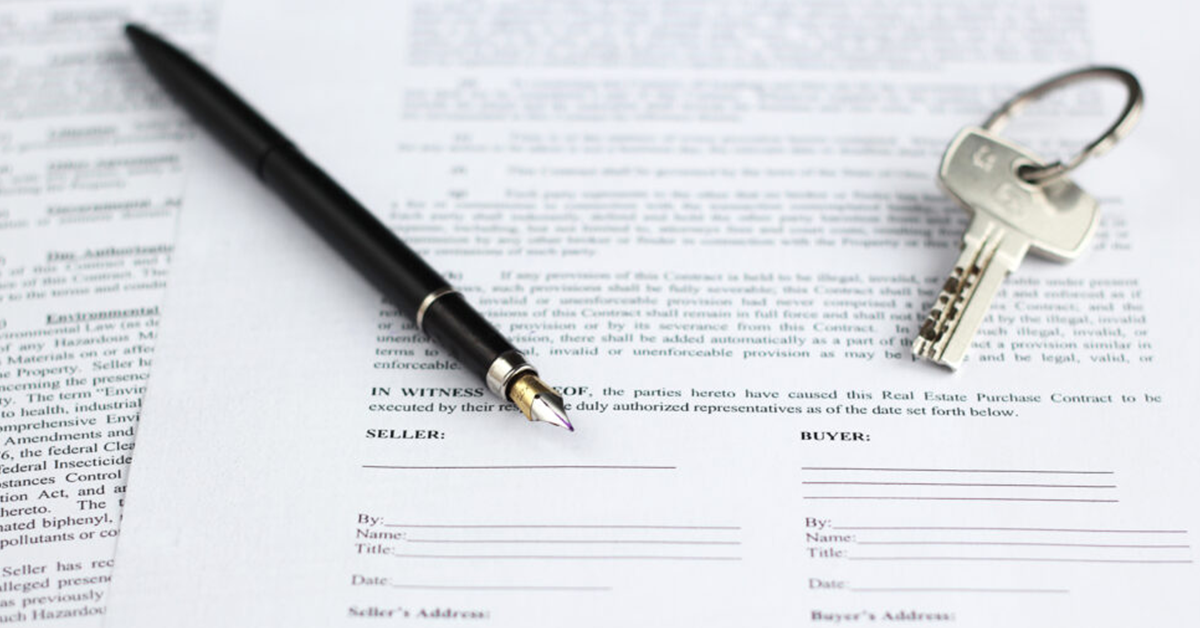Your Guide to the Real Estate Contract
What exactly does a real estate contract do? While you don’t have to be an expert in the ins and outs of this important document—that’s the job of your licensed lender —it’s helpful to at least understanding the basics. Here are the major functions of a real estate contract:
Tells It Like It Is.
The real estate contract basically lists all the facts about the property so that both the buyer and seller are in mutual agreement. That’s to say, no party should know more or less than the other. That goes for everything from the purchase price to the appliances and furniture included in the sale, a deadline to complete the closing, and other important details.
Makes it Official (in Writing).
A contract for the purchase and sale of real estate (aka a real estate contract) must be in writing to be enforceable. That’s why the piece of paper exists. That means even if you agree to purchase a property over the phone or verbally in person, the buyer can’t enforce the sale unless your signature is on that paper.
Has All the Who’s.
A real estate contract must identify the parties involved in the sale, which is a legalese way of saying it’s got to have everyone’s name on it, including those middle initials. If one of the parties is a corporation, it should clearly state the name of the corporation, too (e.g., “Apartment 405, Inc., a Florida Corporation”).
And All the What’s.
Aside from having everyone involved in the sale, a real estate contract must also have the property or properties being sold. To create a binding contract, the description has to be specific, not vague like “my home on the water”. This typically includes the property’s legal description which includes the address, parcel number, plat information and other details.
Show Me the Money, Ahem, Price.
The real estate contract must state the purchase price for the property, which is the amount the buyer is offering to pay the seller.
Includes the Consideration.
This is anything of legal value like money, interest or services that’s in the real estate contract.
Whatever it is, it must be clearly spelled out. For the most part though, it will be the buyer’s earnest money (which is different than hard cash), which shows the buyer is serious about their offer.
Your Signature Please
An unsigned real estate contract is as good as no contract at all. In order to be enforceable, a contract must be signed by parties who are of legal age and sound mind. It’s not really mandatory to have a notary’s signature or witness, although it may be a good idea, just to have all your bases covered. You can also fax a signed contract, as long as the contract states that faxed signatures are valid.
In order to be considered valid, a real estate contract must satisfy all of the above requirements. Once a real estate contract becomes valid, aka legally enforceable, the real estate purchase can move on its way to closing.
1. Is the asking price in line with similar homes in the area?
It’s important to have an idea of how much other homes in the area are selling for. That’s because most real estate experts actually look at the value of nearby homes when estimating a home’s price. Of course, no two homes are alike—even if they’re only blocks apart—so prices will vary depending on unique differences, such as a water view or modern appliances. You don’t need your broker to be precise, but simply having a ballpark figure can help you determine if there’s any wiggle room in your offer.
2. How much will I have to spend to get it just the way I want it?
Are you happy with the way the home is right now, or do you see some walls you’d love to knock down? You may want to decide if you’d be okay with just moving in without touching a power tool (or hiring a trusted handyman or home professional), or if there are some renovations or modifications you’d have to make before your new home feels like, well, home.
3. When was the last home inspection?
Aside from cosmetic updates and renovations, you’ll want to make sure the property you’re making an offer on doesn’t have any costly hidden surprises. Plumbing, roofing and electrical fixes, for example, can cost you tens of thousands or more, so you’ll need to know that everything is in top-top shape before you make a move—or move in! Although a home inspection will set you back a couple of hundred dollars, it will save you lots more down the line—not to mention a headache. Your real estate broker can help you set up a home inspection with a qualified, reputable professional. A home inspection can also be used as a contingency, which lets you back out of your offer without any penalty if the inspection exposes certain defects.
4. How long has the home been on the market?
If a home has been on the market for a long time, it could mean there’s a potential issue with the property, in which case a home inspection would be a good idea. Or perhaps the seller hasn’t been willing to budge on the asking price—until now, when he or she might be eager to accept a lower-than-usual offer. While you shouldn’t be turned off if a home has been on the market for a while, it’s good to do your homework and ask your real estate broker for some details.
5. How much of a mortgage will be required?
Before you make an offer, you should ask yourself if you can truly afford the mortgage you’re committing yourself to. According to a 2019 survey by CoreLogic, one-third of homebuyers reported spending more than they expected to on their home. So, before you settle on making an offer, it’s totally ok to speak with a mortgage professional and ask: “What’s the mortgage again?”
Aside from these top questions, when making an offer on a home you’ll also want to ask yourself: “How much do I really want this home?” All things considered—and making sure you covered all your bases and have done your research—the closer your offer is to the asking price, the more likely it will be accepted.





